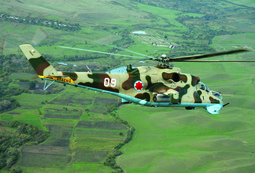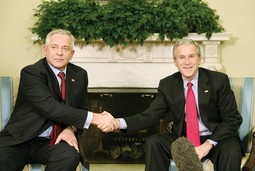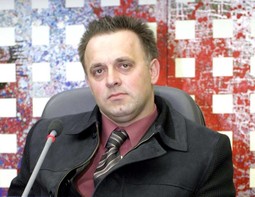Published in Nacional number 594, 2007-04-03
DIPLOMATIC SCANDAL WITH RUSSIA
Mi-24 Helicopters Land Croatia in Caucasus Cold War
CROATIA AGREED to sell Georgia, a US ally in the Caucasus, six gunship helicopters, but backed out after the Russians threatened diplomatic sanctions
 Georgia desperately tries to get parts for helicopters Mi-24Croatia found itself in a very delicate situation in October of 2006. While it was on the one hand ready, with US approval, to sell six Russian Mi-24 helicopter gunships, in parts, to Georgia, it was on the other hand faced with the possibility that the move could bring into question the achievement of its foreign policy goals in its relations with the Russian Federation, above all a meeting in the summer of 2007 between Croatian Prime Minister Sanader and Russian President Vladimir Putin and the signing of an agreement on the increased delivery of Russian natural gas. The Croatian defence ministry and the Alan d.o.o. state agency for arms transactions closed a deal on 9 October 2006 under classification VT 803-05/06-03/1 and filing number 512M3-06-34 based on which Alan d.o.o. was to have sold Georgia six Russian Mi-24 helicopters that had been written off and declared non-perspective in the Long Term Armed Forces Development Plan. The Alan agency had issued an international invitation for tenders in the summer of 2006, and, when it had been completed, confirmed in one of its letters that the disassembly and preparation for transport of the six helicopters would be entrusted to Georgia, which intended to purchase the Mi-24's.
Georgia desperately tries to get parts for helicopters Mi-24Croatia found itself in a very delicate situation in October of 2006. While it was on the one hand ready, with US approval, to sell six Russian Mi-24 helicopter gunships, in parts, to Georgia, it was on the other hand faced with the possibility that the move could bring into question the achievement of its foreign policy goals in its relations with the Russian Federation, above all a meeting in the summer of 2007 between Croatian Prime Minister Sanader and Russian President Vladimir Putin and the signing of an agreement on the increased delivery of Russian natural gas. The Croatian defence ministry and the Alan d.o.o. state agency for arms transactions closed a deal on 9 October 2006 under classification VT 803-05/06-03/1 and filing number 512M3-06-34 based on which Alan d.o.o. was to have sold Georgia six Russian Mi-24 helicopters that had been written off and declared non-perspective in the Long Term Armed Forces Development Plan. The Alan agency had issued an international invitation for tenders in the summer of 2006, and, when it had been completed, confirmed in one of its letters that the disassembly and preparation for transport of the six helicopters would be entrusted to Georgia, which intended to purchase the Mi-24's.
Nacional learned from sources close to the Military Security Agency that nine members of the Georgian Air Force's technical services had arrived in Croatia to implement the project – Georgi Lomkidze, Ilia Paziashvili, Severiane Kintsurashvili, Soso Njauri, Nugzar Gagua, Besk Chimchiuri, Nodar Begalashvili, Teimuraz Mgaloblishvili, and Ucha Panjakidze. They spent almost a month disassembling the helicopters in question and preparing them for transport, and had already prepared two of the Mi-24 helicopters for departure. Neither of the two already disassembled Mi-24 helicopters was, however, shipped to Georgia, the only reason being of a political nature, as delivery was stopped in the last minute, about three months ago, because of possibly dramatic repercussions in relations with Russia. The Georgians were told that they did not meet the conditions of the tender after they had already prepared for departure, and that a sales contract would not, after all, be signed with them, which made no sense; because if the conditions of the tender had not been met for the sale of the helicopters to the Georgians, the question is why they were even allowed into Croatian Air Force hangars to prepare the helicopters for transport. It is clear that the US convinced the Georgians to back out of the deal after Russia discovered that Croatia intended to sell Georgia the helicopters in parts. The Georgians are in dire need of parts for the Mi-24 helicopter, which is confirmed by information that a company in Dagestan was accused by the Russians a month ago of illegally transferring rotors for the Mi-24 into Georgia. The Russian pressure eased after the sale of the helicopters to Georgia was abandoned, and it was willing to discuss a top-level meeting of Croatian and Russian officials, which was followed by a series of meetings this year between Russian and Croatian officials in preparation of the meeting and resulted in the announcement of a possible trip by Russian President Putin to Croatia this summer.
 Ivo Sanader and George BushCroatian Prime Minister Ivo Sanader, preparing last year for his official visit to the USA, wanted to earn additional US favour with President Bush by backing the US policy of NATO's expansion to the Caucasus with a concrete contribution, that being the sale of helicopters to the key US ally in the region. On the other hand, his endeavours to visit Russia were flatly turned down, and the Russians threatened not to sign an agreement with Croatia on increased natural gas deliveries.
Ivo Sanader and George BushCroatian Prime Minister Ivo Sanader, preparing last year for his official visit to the USA, wanted to earn additional US favour with President Bush by backing the US policy of NATO's expansion to the Caucasus with a concrete contribution, that being the sale of helicopters to the key US ally in the region. On the other hand, his endeavours to visit Russia were flatly turned down, and the Russians threatened not to sign an agreement with Croatia on increased natural gas deliveries.
The move could have directly involved Croatia in a conflict in one of the world's largest crisis areas, the Caucasus. A large-scale political war is ongoing there, sometimes breaking out into armed conflict, between Georgia under US patronage on the one side and Russia with the breakaway Georgian regions of Southern Ossetia and Abkhazia on the other, all for control of the oil-rich Caspian Sea. The Caucasus area and control of it are of key strategic importance both to Russia and the US.
Georgia is a sovereign state and no one can prohibit it from equipping and arming itself, but it is also the only country today in which the interests of Russia and the US are in quite open conflict over the control of the energy sources of the Caspian basin, after the Middle East the world's largest source of oil. Russia is also particularly concerned over the further widening of NATO to Georgia, which it considers a direct threat to its own national security.
Croatian Government prevented a straining of its relations with Russia in the last minute and decided to halt any deliveries of weaponry and military equipment to the crisis area, among other things, because Russia's economic strength is growing from year to year, especially in the field of energy production, on which most of Europe is dependent.
Russia would consider the direct sale of helicopter gunships to Georgia an unfriendly act, as it would be a signal to it that the pro-Western Georgian regime was readying itself to attack the breakaway regions, under Russia's political and military patronage. Just how sensitive an issue the export of armaments to the Caucasus area is, is demonstrated by the case of Serbia.
On 29 December 2006 Russian Ambassador Aleksandar Aleksejev gave Serbian President Boris Tadic Russia's positive answer on the possibility of exporting weaponry produced by the Kragujevac-based Zastava armaments factory to Armenia. Serbia had called off the export of arms to Armenia to maintain good relations with Moscow, because of the problems Russia had in the Caucasus region Armenia is a part of. Aleksejev and Tadic agreed at the time that the scope and type of weaponry being exported from Serbia should not threaten the balance of power in the Caspian region. Croatia could not have made this decision on its own, without US approval because, outside of birds, nothing can enter the region in question without the consent of the US and Russia. Interestingly, Croatian made the move just ahead of last year's NATO summit in Riga, where support was expected for a 2008 invitation to membership.
Bilateral meetings in 2006 between Croatian and Georgian officials, however, clearly showed that the helicopter deal had been worked out much earlier. It is probably a rarity of global proportions that after the absence of any kind of intensive diplomatic relations beforehand two countries should in the span of only a year hold three meetings at the highest level. That happened with Georgia and Croatia. First, in late March of 2006, Georgian President Mihail Saakashvili was in Croatia on a working visit and was received by Croatian President Stipe Mesic. Georgia and Croatia, said Mesic at the time, had not signed the basic agreements needed to allow for and facilitate economic cooperation.
 Ivica NekićGeorgia and Croatia did not sign a single bilateral agreement. Then, in early May of 2006, only a month and ten days after the Georgian president's visit to Croatia, Mesic visited Georgia, and the Georgian defence ministry was visited from 29 to 31 August of 2006 by Igor Pokaz, assistant to the Croatian defence minister for international relations, just over a month before the sale of the Mi-24 helicopters to the Georgians went ahead. The crisis in the Caucasus could escalate into a conflict of unforeseeable consequences for global security, and the region's problems are in the focus of the world's top geo-politicians.
Ivica NekićGeorgia and Croatia did not sign a single bilateral agreement. Then, in early May of 2006, only a month and ten days after the Georgian president's visit to Croatia, Mesic visited Georgia, and the Georgian defence ministry was visited from 29 to 31 August of 2006 by Igor Pokaz, assistant to the Croatian defence minister for international relations, just over a month before the sale of the Mi-24 helicopters to the Georgians went ahead. The crisis in the Caucasus could escalate into a conflict of unforeseeable consequences for global security, and the region's problems are in the focus of the world's top geo-politicians.
The crisis in the Caucasus started with the break-up of the Soviet Union. Southern Ossetia, a mountainous region running along the border between Georgia and Russia, covering 3,900 square kilometres, unilaterally declared its independence from Georgia in the early 1990s, demanding unification with the Russian republic of Northern Ossetia. War broke out, ending in 1992 with a peace treaty and the arrival of peacekeeping forces from Russia, accused by Georgia of being biased. The conflicting sides agreed in 1996 on a peaceful solution to the dispute, but the final status of the region has yet to be established. Georgia, Southern Ossetia and Russia now have 500 soldiers each in joint peace forces, with the truce monitored by a joint commission also including representatives of the Organisation for Security and Co-operation in Europe. After winning the elections of January 2004, Georgian President Mihail Saakashvili promised to reunite Georgia and return the three breakaway regions to central government control. The southern region of Ajaria was quick to capitulate, but Southern Ossetia and the significantly larger Abkhazia with its 8,600 square kilometres expressed their willingness to defend with arms their effective 12-year independence.
In the former Soviet Union, Abkhazia had the status of an autonomous republic, while Southern Ossetia and Ajaria were autonomous territories within Georgia. The conflict has intensified over the past year. It all started with the Georgian arrest of four Russian officers, under allegations that they were involved in military espionage. Russian then cut off air, sea, land and postal traffic with Georgia. It all looked like a Russian declaration of economic war against Georgia. The Georgians are unhappy with the Russian meddling in their internal affairs, especially the support they give to the separatists in Abkhazia and Southern Ossetia.
Sergej Lavrov, the Russian foreign affairs minister, drew a direct correlation between the arrests of the Russian officers and the NATO decision to launch an "intensive dialogue" on membership with Georgia. Sergej Ivanov, defence minister and Putin's likely successor after 2008, for his part accused some NATO members of making illegal arms shipments to Georgia. President Saakashvili is well aware that his country has no perspective of accession to NATO or achieving full sovereignty if it does not find a solution to the issues of Abkhazia and Southern Ossetia. And that is not possible while the regions in question are assisted by Russia. The possibility that Moscow might officially recognise the independence of these regions is not excluded if Western governments recognise the independence of Kosovo.
Croatia avoided straining its relations with Russia in the last minute and the decision not to export the helicopters to Georgia was made in order to secure a top-level Croatian-Russian bilateral meeting this year that should address some key and open bilateral issues.
Related articles
Fatal modifications ordered by Zagorec
The results of the investigation of the commission that investigated the fall of a Mi-8 VIP helicopter in Vukovar last year have shown without a… Više
Latest news
-
28.10.2010. / 14:15
'A profitable INA is in everyone's interest'
-
28.10.2010. / 09:38
Sanader’s eight fear SDP — Won’t bring down Government
-
21.10.2010. / 15:02
Interior Ministry turned a blind eye on Pukanic assassination
-
20.10.2010. / 09:34
Barisic could bankrupt HDZ




